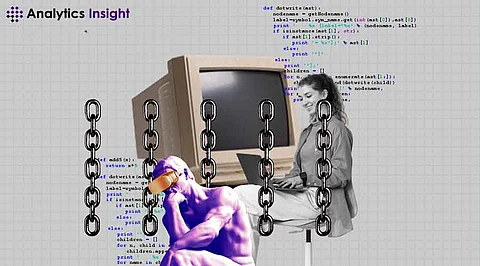

Blockchain technology is the revolution of the digital era, driving innovation in different industries by inventing the concept of a decentralized ledger, one that has changed our understanding of security, transparency, and data integrity. Can someone learn the basics of blockchain over the weekend? This article will see if one can master this technology in a short time, while also providing a roadmap for people interested in this complex yet amazing field and those raring to go over a short period.
Before plunging oneself into the learnings of a blockchain, a learner should have a basic idea of what blockchain technology is all about. To put it in simpler terms, Blockchains can be defined as decentralized digital ledgers that have the power to record transactions across several computers in a way that the registered transactions become irreversible. Each "block" contains a list of transactions inside it and in Blockchain technology, each one is linked to its previous one, creating a "chain." This structure provides considerable security and transparency and remains one of the fundamental bases for state-of-the-art technologies such as cryptocurrencies, supply chain management, and smart contracts.
Key Elements: Blockchain incorporates the following key elements:
Block: In blockchain technology, a block is a piece of data or transaction created and shared between the parties with a timestamp.
Nodes: In nodes, members of the network maintain and validate the blockchain and related transactions.
Consensus mechanisms: Procedures via which nodes of the blockchain agree on the validity of the transactions and the order of their appearance in the block. For example, Proof of Work or Proof of Stake.
Day 1: Preparatory Base of Knowledge
Conceptual Introduction to Blockchain: One should first understand what blockchain is all about through conceptual knowledge. Beginners can be given a comprehensive introduction to this topic through online courses, articles, and videos. Websites like Coursera, Udemy, Khan Academy, and many others give courses one can take on some blockchain basics.
Grasp of Multiple Blockchain Architecture: One should know how blocks get created and link up. You should also understand the consensus algorithms for maintaining blockchain integrity.
Use-Case Scenarios: Search for uses of the technology beyond cryptocurrencies in real-world applications, and check for uses in the supply chain, health, or voting systems. In this regard, one can get an overview of the subject.
Day 2: Direct Workshop
Setup a Blockchain Environment: Configure and install a blockchain platform such as Ethereum, or Hyperledger Fabric, available platforms and guides can be found on GitHub and in the official documentation of the tools mentioned.
Create a Simple Smart Contract: Create and deploy a basic smart contract to a test network. Platforms such as Remix IDE and Solidity documentation include step-by-step tutorials for beginners.
Blockchain projects: Explore platforms such as GitHub and Stack Overflow by contributing to blockchain communities and projects. Open-source blockchain projects help gain practical experience as well as networking.
Books: "Blockchain Basics: A Non-Technical Introduction in 25 Steps" by Daniel Drescher is a strong foundational one.
Online Courses: Coursera and Udemy are great platforms for doing some blockchain courses for a successful crypto career. You can quickly learn titles such as "Blockchain Basics" and "Ethereum and Solidity: The Complete Developer's Guide."
Websites: Blockchain.com and CoinDesk for news, tutorials, and information about updates in the blockchain technology area.
This means, that over a weekend, learning the blockchain would turn out to be a challenge. Due to the complicated nature and the actual need for practical experience, mastering the basics of a blockchain in so little time would seem rather aspirational. While you'll get to know and have hands-on practice, your real ability will come with more time spent on learning.
To some extent, over a weekend, you can learn blockchain. A bit of focus and the right resources can get you the basic concepts and make you able to work with blockchain technology. Still, some more continuous research and practice for a better understanding and expertise in your practice should follow after the weekend. So, take on the challenge, and use the weekend as a stepping stone into further learning in the world of blockchain.
1. What is meant by the basic concept of blockchain technology?
Basic concepts of blockchain technologies include decentralized ledgers, blocks of data, consensus mechanisms, and cryptographic security. Understanding these core concepts will be elemental in understanding the operation of blockchain and its various applications.
2. Can I be good at blockchain technology over a weekend?
While you can uncover the basics of blockchain in one weekend, you need to maintain ongoing studies and practical experience to become proficient. A weekend is a good place to start deep learning.
3. What are the most useful resources for learning blockchain fast?
Use online courses hosted on platforms like Coursera, and Udemy, or foundational books, topics such as ‘Blockchain Basics’ by Daniel Drescher. Dive deeper into blockchain communities and tutorials for practical insights.
4. How to practice blockchain technology in a short period?
Create a blockchain environment, write a simple smart contract, and work on blockchain projects using GitHub. As you practice in reality, this will solidify your theoretical knowledge.
5. What problems do people usually have while learning blockchain on a weekend?
The difficulties with some of the conceptual ideas in blockchain, and most evidently the many practical experiences needed. You can get the basics, but to be proficient usually takes more time and further learning.
